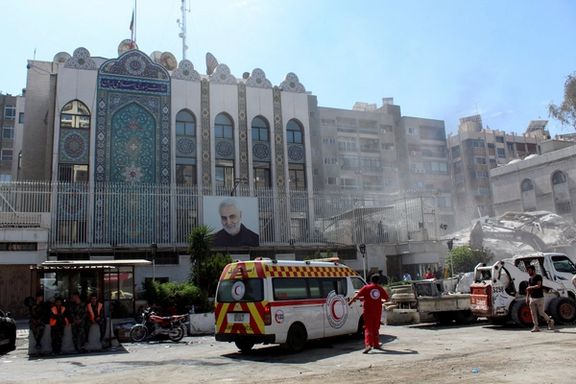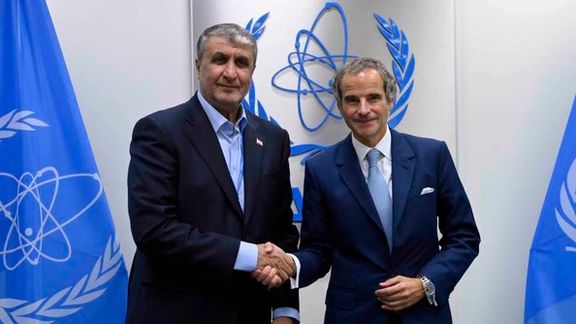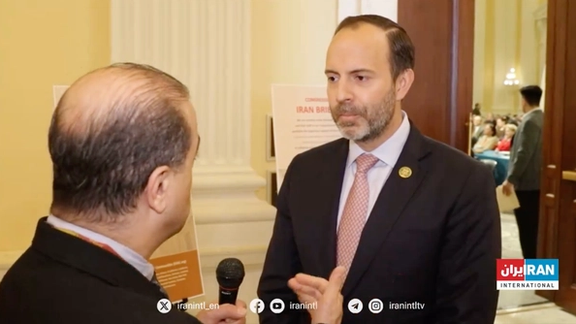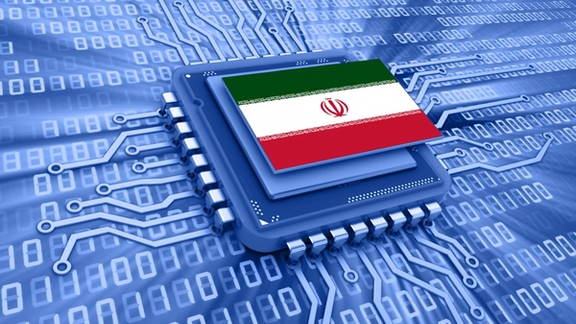Iran Prepares For Possible Israeli Retaliation

After Iran's missile and drone attack aimed at Israel over the weekend, the country is bracing for possible retaliatory attacks either on its territories or proxies.

After Iran's missile and drone attack aimed at Israel over the weekend, the country is bracing for possible retaliatory attacks either on its territories or proxies.
This comes after the Iranian government had made preparations to safeguard their assets, which included activating the air force for possible strikes, and deployment of navy escorts for commercial Iranian ships in the Red Sea.
In addition, the Wall Street Journal reports that they are in the process of evacuation at Iranian bases within Syria, especially where the Islamic Revolutionary Guard Corps (IRGC) predominantly resides.
After launching more than 350 drones and missiles, officials in Israel warned of a counter strike without specifying what kind of response is to be expected.
The US, along with European nations, has urged Israel to refrain from retaliation that could escalate tensions further.
German Foreign Minister Annalena Baerbock and Britain’s former Prime Minister David Cameron had separate meetings Wednesday with Israeli Prime Minister Benjamin Netanyahu, in which they echoed a message of de-escalation.
The Biden administration also plans to shore up the diplomatic effort with new economic sanctions on the IRGC and its economic links to Iran's missile and drone programs.
On the military front, it is reported that Iran ordered emergency protocols, especially in Syria, where the IRGC and Hezbollah have adjusted their presence and heightened security measures in anticipation of potential Israeli strikes.
Tehran also indicated that it would respond to any Israeli attack. “The smallest action against Iran’s interests will definitely be met with a severe, extensive and painful response against all its perpetrators,” Iranian President Ebrahim Raisi said.

Weeks after Iran International TV host Pouria Zeraati was stabbed in London, Reporters Without Borders (RSF) is urging the UK to step up its protection of Iranian journalists.
In its report released on Wednesday, RSF called on the government to take all necessary measures to ensure the safety of Iranian journalists who are targeted with a “chilling and far-reaching threat” from Iran.
The investigation into the attack on Zeraati is being headed by the Metropolitan Police's Counter Terrorism Command, due to previous threats towards Iran International’s journalists.
In its report, the press freedom watchdog documented a rise of transnational threats faced by Iranian journalists working and living in the UK.
While the report found that Iranian journalists working abroad often face intimidation or harassment, including in the US, France, Germany, Sweden, and the UK, London is considered a "hotspot" for such attacks – given the number of prominent Persian-language broadcasters in the city.
The Iranian government has long threatened Iran International, with several journalists at the network facing imminent threats of attacks in the years 2022 and 2023.
The news network's offices were temporarily relocated from London to Washington last year after threats escalated to a level that domestic security services could no longer guarantee the safety of the staff.
According to the RSF report, almost 90% of Iranian journalists surveyed had experienced online threats or harassment in the past five years, including death and rape threats.
Families of journalists also routinely faced threats from Iranian authorities.
Approximately 60% of respondents in the report said that their families had been threatened, including being called in for interrogations, applying economic penalties, such as asset freezes or job losses, removing passports, travel bans, surveillance, tapping phone calls, and detentions.
The report also revealed that there are deficiencies in the support provided to journalists by law enforcement and social media platforms, partly because their plight is perceived as a “foreign priority, rather than domestic.”
The majority of journalists said they had negative experiences when they reported attacks to police, who did not understand the context or gravity of the threats they faced.
Only 13% of respondents reported abuse to the police over the past five years, with many considering it “a waste of time”.
Although online threats and harassment are high, journalists who report online abuse have overwhelmingly negative responses.
According to many respondents, complaints made to social media platforms were ignored or dealt with unsatisfactorily.

The head of Iran's Atomic Energy Organization, Mohammad Eslami, said on Wednesday that the International Atomic Energy Agency monitoring is in place and UN nuclear chief Rafael Grossi will soon visit Iran.
Mohammed Eslami did not specify a date for Grossi's visit in his comments. However, based on his previous remarks, the date might be as soon as early May. In February, Eslami announced that Grossi would attend the first international nuclear energy conference in Isfahan, coinciding with the 50th anniversary of establishing the Atomic Energy Organization of Iran.
However, Iran’s nuclear chief did not mention the closure of the nuclear facilities for 24 hours on Sunday in the wake of Iran's aerial bombardment which saw 350 plus missiles and drones launched towards Israel.
The IAEA director said on Monday that Iran closed its nuclear facilities on Sunday due to threats of an Israeli attack, fearing retaliation to the bombardment which saw forces from the UK, US, Jordan and France work to intercept the majority of the projectiles before they reached Israeli territory. While they reopened on Monday, Grossi said he would keep IAEA inspectors away until the situation calmed down.
As Israel considers whether to launch a counterattack, there has been speculation that some nuclear-related sites may be targeted. In response to a question regarding the possibility of Israel striking Iran's nuclear sites, Grossi replied on Monday, “We are always concerned about this possibility.”
Eslami also downplayed the tension by claiming that cameras are installed and "constantly monitor" the nuclear facilities and that inspectors also visit them regularly.
Iran said the attack on Saturday was an action of self-defense in retaliation for an alleged Israeli strike on its consulate in Damascus on April 1. It was the first direct action initiated inside Iran against Israel and began a new chapter in the conflict between the two countries previously engaged in a years-long shadow war.

Iranian President Ebrahim Raisi warned on Wednesday that any "tiniest invasion" by Israel would face "massive and harsh" response from Iran as the two archenemies sit on the verge of war.
His threats came during an annual army parade which had been moved from its usual venue, a highway in southern Tehran, to a barracks north of the capital. Iranian officials gave no reasons for the venue change, and unlike in past years, the event was not live on state television.
Speaking about the weekend air attack in which 350 plus drones and missiles were fired towards Israel a "limited action" and warned that in case of a more expansive assault "nothing will be left from the Zionist regime."
With the help from allies including the United States, the United Kingdom and Jordan, most of the deadly bombardment was intercepted.
The Saturday aerial assault was, Iran claims, in retaliation to an Israeli airstrike on April 1 that targeted the consulate of Iran in Syria, killing several of its staff from the Revolutionary Guards, including two generals.
Israel has not detailed its response to the Iranian attack immediately but has vowed action will be taken. Its allies called for restraint from all sides to avoid further escalation.

Several Republican and Democratic lawmakers have endorsed a potential Israeli retaliatory attack against Iran, branding the Biden administration too soft on its archenemy.
The congressmen told Iran International that they viewed Iran's attack over the weekend as a failure but believed Israel's response was "necessary".
“If they [Iran] intended to create a lot of chaos and cause damage in Israel they weren't successful,” but the Iranian regime “crossed the red line,” Republican Representative Lance Gooden (R-TX) told Iran International.
Representative Steve Cohen (D-TN) believed the escalation did not start with Israel killing IRGC commanders in Iran’s consulate in Syria earlier this month, which Tehran claims was the trigger for the aerial bombardment this weekend, as the regime was involved in Hamas’ October 7th attack against Israel.
“This has been going on for a while as Iran trained some of the leaders of October 7 in the country,” he explained. Iran-backed Hamas invaded Israel on October 7, killing 1,200 mostly civilians and taking over 250 more hostage.
Earlier this month, an alleged Israeli air strike hit the Iranian consulate in Damascus, killing a senior Quds Force commander and several other IRGC personnel. Tehran claims the weekend's bombardment of over 350 missiles and drones was an act of self defence in response to the strike.
Democrat Cohen said the operation was done with the intent to “kill people”. He added, “Israel will respond. And I support Israel.” The majority of the projectiles were intercepted on Saturday night by Israel and its allies including the UK, US, Jordan and France in one of the most complex aerial missions in modern warfare.
Biden has stated the US will not take part in any Israeli attack against Iran, though says it will support the Jewish state in the face of attack. Since the Biden presidency began, Tehran has become ever more emboldened, including accelerating its nuclear program.
The Republican Party has long criticized the policies enacted by the Biden Administration regarding Iran. Biden has come under fire for releasing $6 billion of Iranian oil revenues in September as part of a prisoner exchange agreement and also for granting Iraq a new four-month waiver that enabled the release of billions of dollars to Iran after the October 7 terrorist attacks.
Despite the humanitarian guise, Republicans and Democrats challenged these decisions, arguing that money's fungibility would enable the Tehran regime to divert these funds towards arming its proxies.
Republican Representative Don Bacon (R-NE) stated that “there's a greater risk by being weak in our response to Iran,” as it would lead to a more aggressive response on the part of the regime.
"The Islamic Republic wants to be a caliphate. They want to control the Mideast, have a Shia empire there," he said, adding that "Iran wants to be the regional superpower, and that would be bad for America and bad for our allies."
Republican congressman Randy Weber (R-TX) told Iran International that times must change and a new approach taken with Iran which has been emboldened under Biden. “He's [Biden] giving Iran billions of dollars when we should have had sanctions. They should have been tight. The sanctions should not have been lessened,” he said.
While the White House announced on Tuesday that fresh sanctions would be imposed on Iran, analysts believe that the US will not initiate drastic sanctions on Iran because it is worried about increasing oil prices and angering its top customer, China.
Former president Donald Trump, who Biden is running against in the upcoming presidential elections, has already blamed the ageing president for the Iranian attack on Israel. “It [the aerial bombardment] would not have happened if we were in office,” Trump said in the wake of the bombardment on Sunday.
Under Trump, policies to Iran took a much tougher stance. He pulled out of the JCPOA nuclear agreement and in 2020, the commander of Iran's Quds Force, Qassem Soleimani, was assassinated in an airstrike in Iraq.

The Raisi administration has allocated millions of dollars to advance Iran's national internet infrastructure in an attempt to tighten control over information flow and curb the influence of external media.
The new budget is part of a broader allocation for the Ministry of Communications and Information Technology, which has seen a 25% increase from the previous year, totaling over 195,830 billion rials (approximately $300 million USD).
The government's financial strategy also includes over 150,000 billion rials (over $220 million USD) designated in miscellaneous credits, with a substantial portion aimed at broadening the scope of the national information network. The move underscores a continued push towards a more isolated and state-controlled digital environment, despite mounting domestic and international criticism.
Platforms such as Instagram, X, Facebook, Telegram are not accessible in Iran as a result of the government’s filtering policy, leaving millions unable to work, many small businesses dependent on social networks, especially in remote rural areas and women-run enterprises.
Documents from the Information Technology Organization reveal that the ministry is intensifying efforts to segregate and minimize the national information network’s dependency on the global internet to toughen crackdowns. The shift comes at a time when Cloudflare, a major cloud services provider, has noted a consistent decrease in internet traffic from Iran over the past two years, suggesting increased network isolation.
Compounding the situation are widespread internet disruptions that have plagued consumers and businesses alike, sparking discontent across the country. The Tehran Chamber of Commerce recently called on the government to reassess its approach to internet policy, emphasizing the negative impact of current practices on the business community and the broader economy.






